
The Thai cat breed, also known as Wichienmaat, has a captivating history dating back to its origins in Thailand.
These felines gained popularity when they were presented as gifts to the royal family in Great Britain during the 1800s, allowing their unique characteristics to be recognized worldwide.
As we delve into the discussion surrounding Thai cats, we will explore their size, weight, and distinctive personality traits that make them such sought-after companions.
Moreover, we will touch upon important health considerations and the available options for adoption and rescue.
So, come along and discover the fascinating world of Thai cats, where each picture, characteristic, and fact unveils a new layer of intrigue.
Key Takeaways
- Thai cats, also known as Wichienmaat, originated in Thailand and were brought to Great Britain in the 1800s as a gift to the royal family.
- TICA officially recognized The Thai cat breed in 2009, gaining advanced new breed status.
- Thai cats are medium-sized, most weighing between eight and 15 pounds, although individual cats may vary in size.
- Thais are people-focused, friendly cats that enjoy following their human companions, communicating through meows, and exploring their surroundings.
Origin and History of Thai Cats
The origin and history of Thai cats can be traced back to their roots in Thailand, where they are known as Wichienmaat.
These cats have a long and rich history, dating back centuries.
Thai cats were highly regarded in Thai culture and were often kept as companions to the royal family.
In the 1800s, they were brought to Great Britain as gifts to the British royal family.
This introduction to the Western world helped spread awareness about Thai cats, and they gained popularity among cat enthusiasts.
In 2009, the Thai cat breed was officially recognized by The International Cat Association (TICA).
Today, Thai cats are cherished for their elegant appearance, loving nature, and connection to their Thai heritage.
See another cat breed profile.
Thai Lilac Cat
Thai Cat Size and Weight
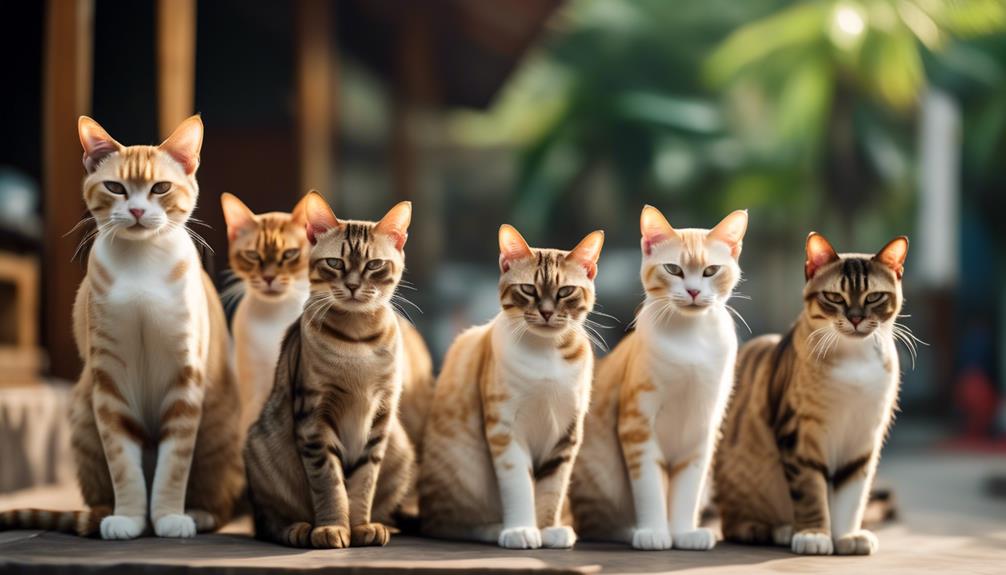
Originating in Thailand, the Thai cat breed is known for its elegant appearance and loving nature.
When it comes to size and weight, they fall into the medium-sized category.
Most Thai cats weigh between eight and 15 pounds, although individual cats may vary in size.
Some Thai cats can be larger or smaller than the average, and size standards for Thais may differ depending on the cat association or organization.
Despite their medium-sized stature, Thai cats are well-proportioned and muscular.
Their bodies are sleek and graceful, with a strong bone structure.
While they may not be as large as some other cat breeds, Thai cats still possess a presence and elegance characteristic of their breed.
Personality Traits of Thai Cats
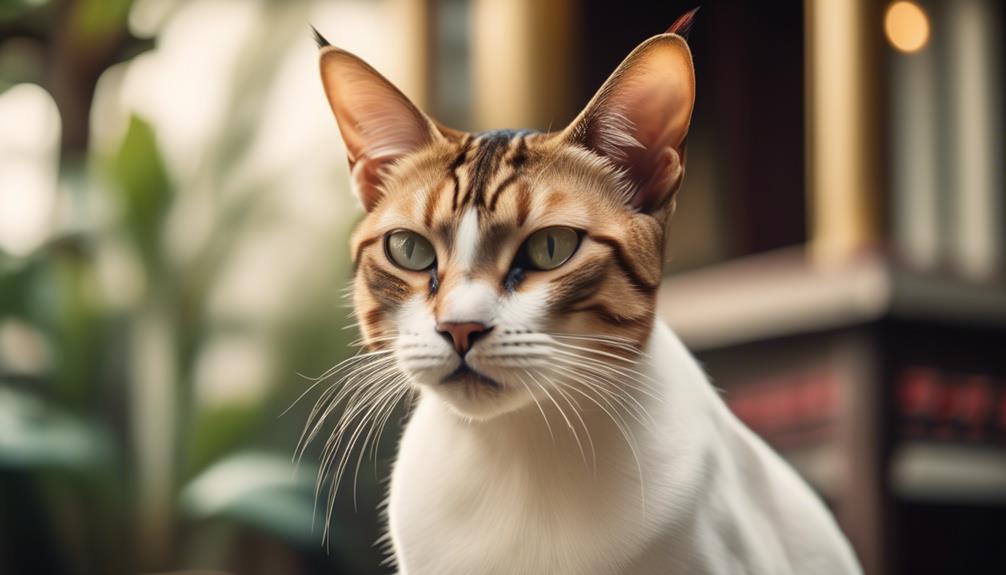
When it comes to the unique characteristics of Thai cats, their personality traits shine through, making them a beloved choice for cat lovers worldwide.
Thais are people-focused cats, often following their human companions from room to room.
They are known to be vocal and communicate with their owners through meows, expressing their needs and desires.
With a curious nature, Thai cats enjoy exploring their surroundings and are always eager to investigate new things.
Their sociable nature makes them great companions for households with young children, as they are affectionate and enjoy interacting with their human family members.
Health Considerations for Thai Cats

To ensure the well-being of Thai cats, it is important to consider their health needs and take proactive measures for their care.
Here are three important health considerations for Thai cats:
- Regular veterinary checkups: Regular visits to the veterinarian are crucial for detecting any potential health concerns early on. These checkups allow the vet to monitor the cat’s overall health, administer necessary vaccinations, and provide preventive care.
- Watch for signs of distress or pain: Owners should be vigilant and watch for any signs of distress or pain in their Thai cats. Cats are masters at hiding their discomfort, so it’s important to be observant and look for subtle changes in behavior, appetite, or litter box habits. It’s best to consult with a veterinarian if any abnormalities are noticed.
- Maintain a healthy lifestyle: Keeping up with wellness visits and providing a healthy lifestyle for Thai cats is essential for their overall health. This includes a balanced diet, regular exercise, and mental stimulation. Additionally, providing a safe, stress-free environment can help prevent potential health issues and promote a happy, healthy life for Thai cats.
Adoption and Rescue Options for Thai Cats
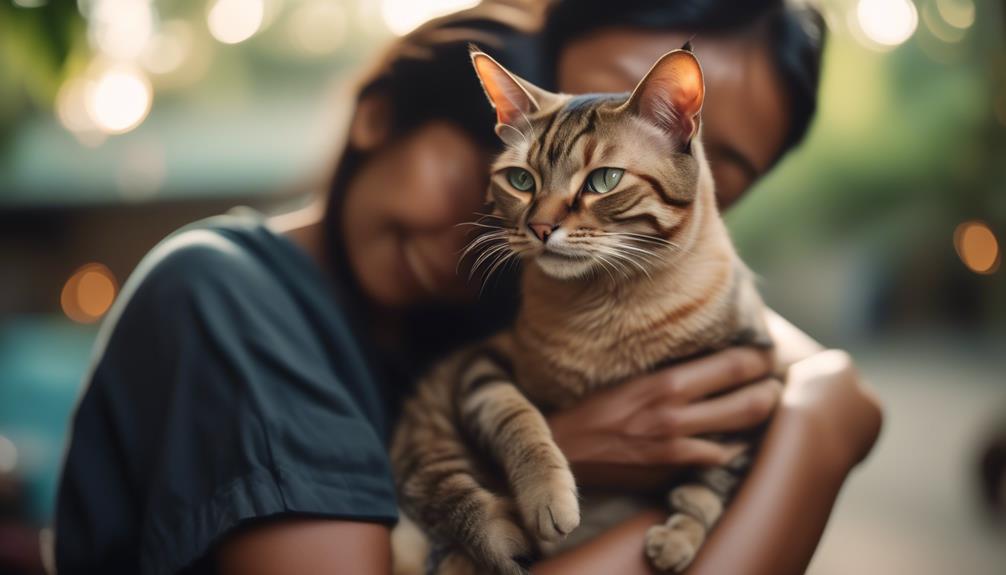
Considering the well-being of Thai cats, exploring adoption and rescue options is a responsible choice for those looking to provide a loving home for these feline companions.
Thai cats can be found in shelters or rescue groups, offering an opportunity to give them a second chance at a happy life.
By adopting a Thai cat, you are not only providing a safe and secure environment for them but also helping to reduce the number of cats in shelters and rescue organizations.
When adopting a Thai cat, it is important to ensure that you are committed to their care and well-being, as they require love, attention, and a dedicated owner.
Adoption and rescue options provide an excellent opportunity to positively impact Thai cats’ lives and experience the joy of a loving and loyal feline companion.
Thai Cat Communication and Behavior
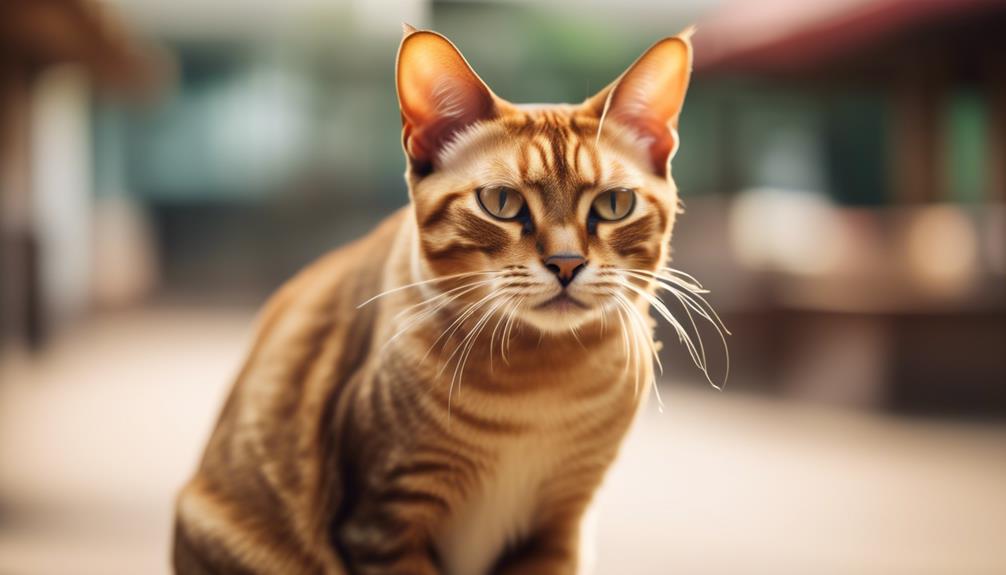
Thai cats exhibit distinctive communication patterns and behaviors that differentiate them from other breeds.
Here are three critical characteristics of Thai cat communication and behavior:
- Vocalization: Thai cats are known to be quite vocal and expressive. They communicate with their owners through various meows, purrs, and trills. This vocalization is how they express their needs, seek attention, or engage in conversation.
- People-focused: Thais are highly people-oriented cats. They enjoy following their human companions from room to room and participating in their daily activities. They thrive on human interaction and are known to form strong bonds with their owners.
- Curiosity and Playfulness: Thai cats are naturally curious. They love exploring their surroundings and investigating anything that catches their attention. Their playful nature ensures they always look for new toys and interactive activities to entertain them.
These communication patterns and behavior traits make Thai cats engaging and affectionate companions for those who appreciate their unique qualities.
Thai Cat Care and Maintenance
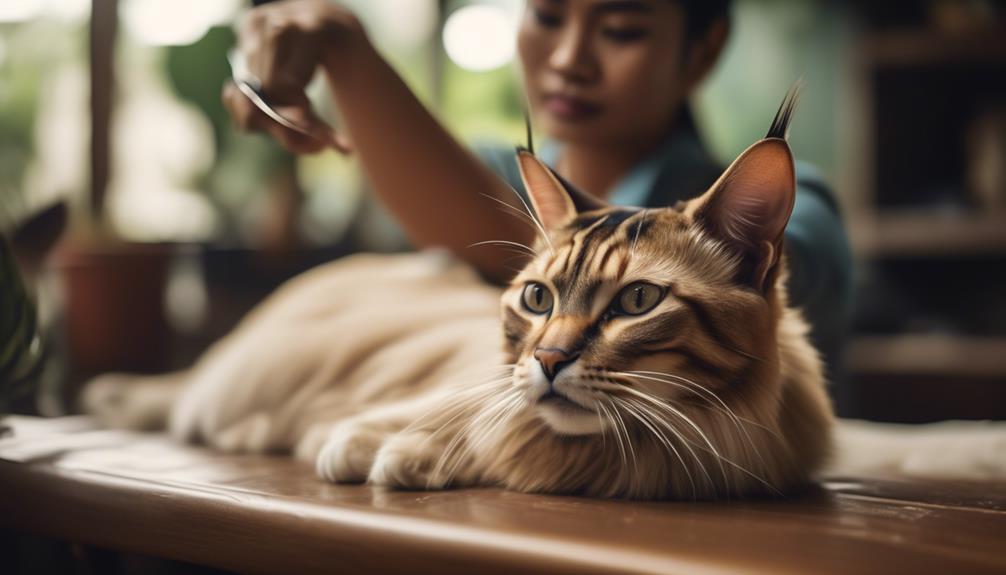
Taking proper care of a Thai cat requires attention to their needs and a commitment to their overall well-being.
Thai cats have a short, dense coat that requires minimal grooming. Brushing their coat once a week is usually sufficient to keep it looking healthy and shiny.
Additionally, regular dental care, such as brushing teeth and providing dental treats, is important for maintaining oral health.
Thai cats are active and intelligent, so providing them with mental and physical stimulation is essential. This can be achieved through interactive toys, puzzle feeders, and playtime with their owners.
It’s also crucial to provide a balanced diet and monitor their weight to prevent obesity.
Regular veterinary checkups and vaccinations are necessary to ensure their health and detect potential issues early on.
Resources for Thai Cat Pictures and Information

To further enhance your knowledge about Thai cats, exploring a range of resources that provide pictures and information about this unique breed is valuable.
Here are three resources that can help you learn more about Thai cats:
- Breed Associations: Visit websites of cat breed associations such as The International Cat Association (TICA) or the Cat Fanciers’ Association (CFA). These organizations often provide detailed breed standards, history, and photos of Thai cats.
- Cat Breed Books: Look for books for cat breeds, including Thai cats. These books typically contain detailed information about the breed’s characteristics, care requirements, and many high-quality photos.
- Online Communities: Join online forums or social media groups dedicated to cat lovers and breed enthusiasts. These communities often have members who own Thai cats and are willing to share their experiences, photos, and valuable insights about the breed.
Frequently Asked Questions
Are Thai Cats Hypoallergenic?
Thai cats are not hypoallergenic. While they produce less allergenic Fel d 1 protein, the main trigger for cat allergies, they still have enough to cause allergic reactions in sensitive individuals.
Do Thai Cats Require a Special Diet?
Thai cats do not require a special diet, but like all cats, they need a balanced and nutritious diet to maintain their health.
Consult with a veterinarian to determine the best diet for your Thai cat.
What Is the Average Lifespan of a Thai Cat?
The average lifespan of a Thai cat can vary depending on various factors such as genetics, diet, and overall health care.
On average, Thai cats can live between 12 to 15 years, but some may live even longer with proper care.
Can Thai Cats Be Trained to Do Tricks?
Thai cats can be trained to do tricks with patience, consistency, and positive reinforcement.
Their intelligence and curiosity make them quick learners.
However, individual cats’ ability and willingness to perform tricks may vary.
Are Thai Cats Prone to Any Specific Behavioral Issues?
Thai cats are generally not prone to any specific behavioral issues.
However, like any cat, individual temperament and behavior can vary.
Providing them with proper socialization, mental stimulation, and a loving environment is important to prevent potential behavioral problems.
Conclusion
In conclusion, the Thai cat is a fascinating breed with a rich history originating in Thailand.
Their medium-sized stature and people-focused nature make excellent companions for households, including those with young children.
Thais are generally healthy cats, but regular veterinary checkups are important for their well-being.
Adoption and rescue options are available for those interested in this breed.
Overall, Thai cats are a unique and excellent addition to any family.




